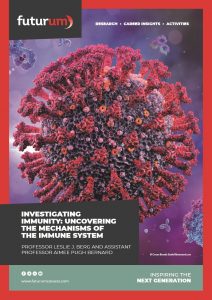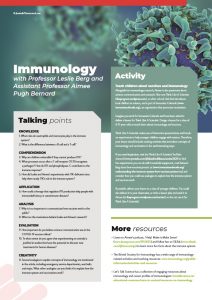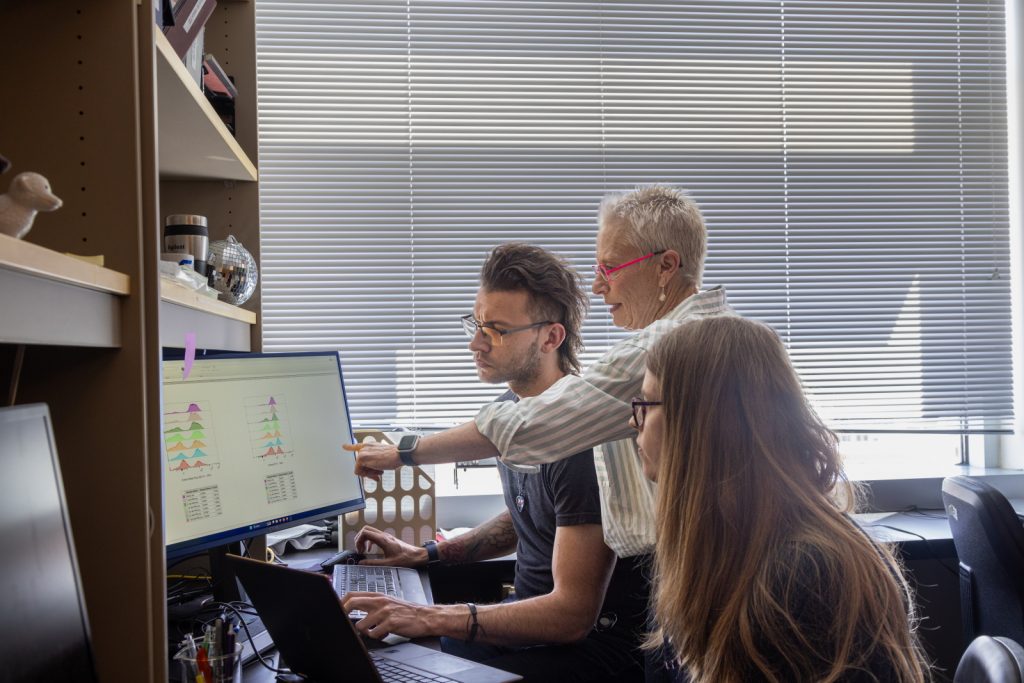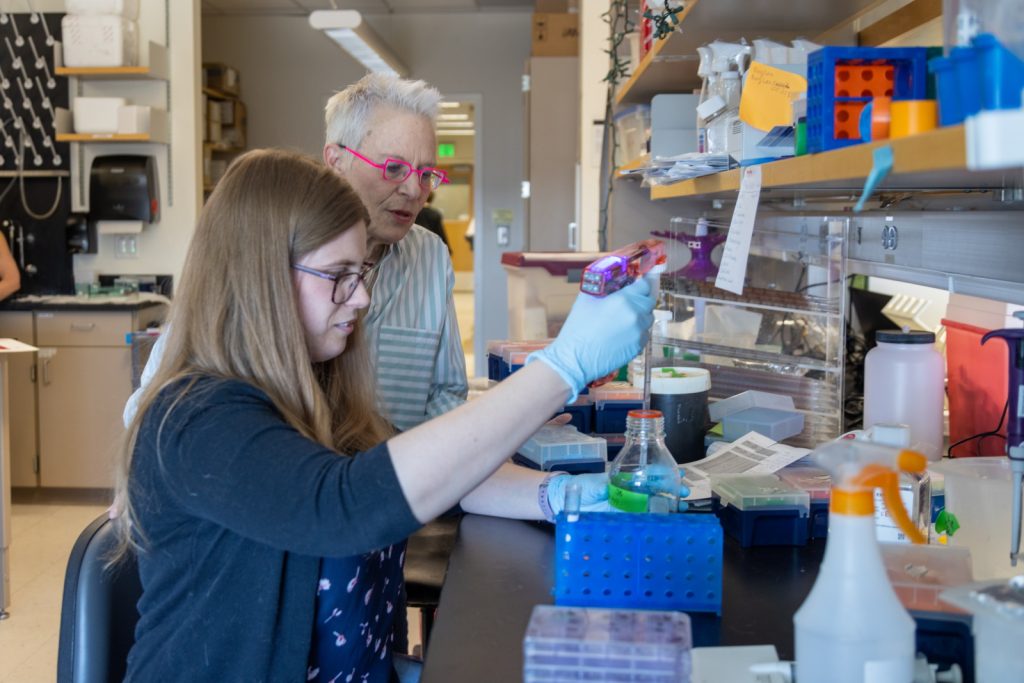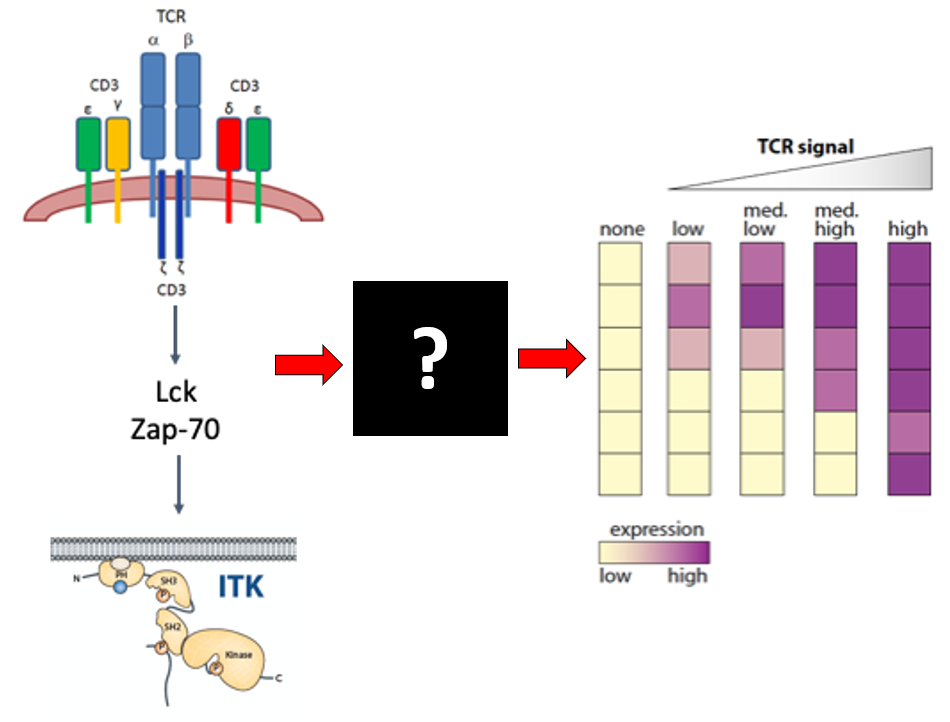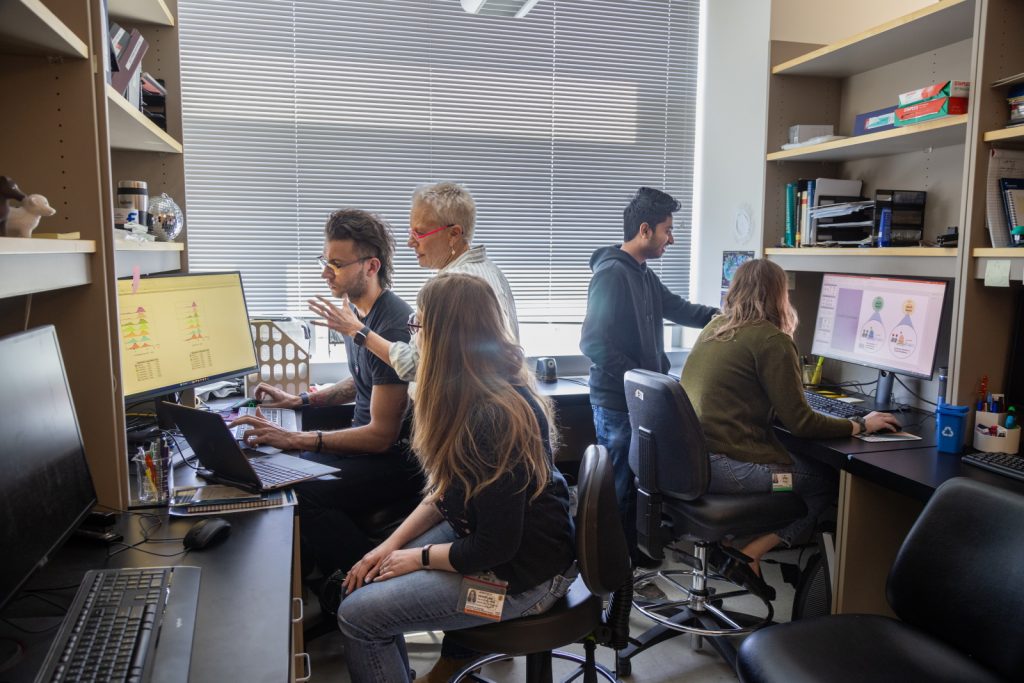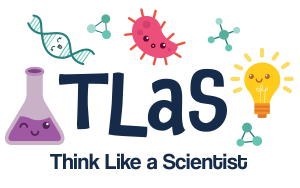Investigating immunity: uncovering the mechanisms of the immune system
Our immune systems work around the clock to keep us safe from disease. Whenever we become infected with a virus or bacteria, our immune systems jump into action – locating, identifying and destroying the infectious agent. This complex process involves a whole host of different cells, each with their own specific function. At the University of Colorado Anschutz School of Medicine in the US, Professor Leslie Berg and Assistant Professor Aimee Pugh Bernard are gaining a deeper understanding of how our immune cells function.
Talk like an immunologist
Antibody — a protein produced by the immune system that binds to antigens and aids in their destruction
Antigen — any compound in the body that triggers an immune response
Autoimmune disease — a disease in which a person’s immune system attacks their own cells
Enzyme — a protein that speeds up chemical reactions in an organism
Immune system — the body’s defence against infection. The innate immune system fights any pathogens while the adaptive immune system targets specific pathogens
Immunodeficiency — when the immune system’s ability to fight infections is greatly reduced or entirely absent
Kinase — an enzyme that modifies proteins by adding phosphate (PO43-) to them
Pathogen — a microbial agent such as a virus, bacterium or parasite that causes disease
T cell — a type of white blood cell that targets specific antigens and aids in their destruction
T cell receptor (TCR) — a protein on the surface of a T cell that recognises antigens
If you have ever had the flu, you will know how draining it can be – you probably lay in bed with a runny nose and sore throat, staring blankly at the ceiling and feeling sorry for yourself. How is it that just lying in bed and not moving can be so exhausting? Well, feeling tired is actually a sign that your body is working very hard to make you better. Being ill can be tiring because your immune system is working overtime to fight off the infection.
What is the immune system?
Your immune system is the natural defence mechanism that protects your body from infectious agents, such as viruses. In the same way that our emergency services contain different departments, such as police, paramedics and fire fighters, our immune systems contain many types of cells, each with a unique function.
After being produced in your bone marrow, white blood cells move through your bloodstream and tissues looking for antigens. Each type of white blood cell has a specific role to play in the immune response. Neutrophils, for example, are the first responders that send out signals calling other immune cells to the infection. Monocytes, on the other hand, are the clean-up crew that get rid of dead cells in your body.
Neutrophils and monocytes form part of the innate immune system, which targets any foreign substances in the body. In contrast, as part of the adaptive immune system, lymphocytes can identify specific antigens and produce a more targeted response. Some lymphocytes even ‘remember’ the antigens they encounter, producing a faster immune response if the infection returns.
B cells (which produce antibodies that help destroy antigens) and T cells (which can directly destroy antigens) are types of lymphocytes. The processes by which these cells recognise antigens is complex, and gaining a deeper understanding of them could have significant implications for the treatment of autoimmune and immunodeficiency diseases. At the University of Colorado Anschutz School of Medicine, Professor Leslie Berg and Assistant Professor Aimee Pugh Bernard are studying T cell receptor signalling pathways to better understand this aspect of the immune system.
What are T cell receptors?
“T cell receptors (TCRs) are proteins on the surface of T cells that recognise infectious agents such as viruses, bacteria or fungi,” explains Leslie. “Each T cell has tens of thousands of identical TCRs on its surface and can only recognise a single type of pathogen.” However, our bodies have billions of T cells, and, collectively, these cells enable our immune system to recognise almost any pathogen that might infect us. Each T cell in our body is uniquely specific, but together, all the billions of T cells combined provide tremendous diversity.
When a TCR recognises a pathogen, it initiates a signalling pathway inside the T cell that instructs the cell to destroy the pathogen. The first step in this pathway is the activation of enzymes known as kinases, which activate other protein molecules by adding phosphate (PO43-) to them. Leslie and Aimee are studying a kinase known as ITK, one of the first kinases activated during the TCR signalling pathway and which plays an important role in amplifying the immune response of T cells.
What happens if someone cannot produce ITK?
Some children suffer from genetically inherited immunodeficiency diseases that affect their ability to produce ITK. If someone cannot produce ITK, or if their ITK does not work properly, their T cells are unable to produce a proper immune response, leaving the person vulnerable to infections. Leslie and Aimee hope that their research on the role of ITK in the immune system will help provide treatments for these kinds of diseases.
How are Leslie and Aimee studying ITK?
“We use genetically modified mice, such as mice whose T cells do not express any ITK protein,” explains Aimee. She and Leslie study the T cells in these mice at a molecular level to determine exactly which immune responses do not work when ITK is missing. “For instance,” continues Aimee, “when we stimulate the TCRs in ITK-deficient mice, we see that these T cells make lower levels of several proteins needed to fight infections.” Another method involves exposing ITK-deficient mice to pathogens and examining their immune response.
In one study, Leslie and Aimee noticed these mice were unable to fight a particular viral infection because the T cells without ITK were unable to move into the gut, where the virus was located. From this, they discovered that ITK signalling is important for helping T cells move into different tissues in the body.
What else have Leslie and Aimee discovered?
Reference
https://doi.org/10.33424/FUTURUM391
Leslie and Aimee have also gained a deeper understanding of the biochemical processes of ITK signalling. They discovered that a key role of ITK is to activate an enzyme known as phospholipase-C, causing it to produce signal molecules that bind to other enzymes in the T cell. These enzymes then stimulate cell division, causing the T cells to multiply and so generating more cells to fight off the infection. “When ITK is missing, this entire pathway is greatly weakened, leading to a diminished response that often fails to eradicate the infection,” explains Leslie.
What are the practical implications of this research?
Leslie and Aimee hope their research into ITK’s function in T cell signalling pathways will lead to the development of new methods for regulating ITK that could be used to treat immunodeficiency, autoimmune diseases and cancer. “Our research findings are relevant to a number of human diseases,” says Aimee. For example, in some autoimmune diseases, T cells mistake native cells for antigens and start destroying them. “In these individuals, an inhibitor of ITK may be beneficial as a treatment for their disease.”
T cells are also used in therapies to treat cancer as it is possible to engineer T cells to recognise and kill cancerous cells in a tumour. “These therapies hold great promise, but fall short of curing many patients,” says Leslie. “The more we learn about how T cell signalling pathways regulate distinct T cell functions, the more we can apply this knowledge to improving T cell engineering.”
The signalling pathways triggered by TCRs are important in determining whether T cells generate a long-term ‘memory’ of a particular antigen. As vaccines rely on this aspect of the immune response, Leslie and Aimee’s research may also inform the development of new vaccines.
“The truth is that we still have much to learn about T cell signalling!” says Leslie. “We have a lot to learn about how these signalling pathways determine the ability of T cells to move in the body, find sites of infection, and then do the best job to eliminate pathogens.”
 Professor Leslie J. Berg
Professor Leslie J. Berg
Assistant Professor Aimee Pugh Bernard
Department of Immunology and Microbiology, Anschutz School of Medicine, University of Colorado, USA
Field of research: Immunology
Research project: Investigating a signalling pathway in T cells that amplifies their immune response
Funder: This work is supported by the US National Institute of Allergy and Infectious Diseases (NIAID), US National Institutes of Health (NIH) and by the Department of Immunology and Microbiology and the Dean at the University of Colorado-Anschutz School of Medicine
About immunology
Immunology is the study of the immune system, which protects us from diseases. Our immune systems are highly complex and sophisticated, and they fight off diseases in many different ways. Understanding how our immune systems function is an essential step for treating many diseases.
Some immunologists study how the immune system protects us, while others investigate what happens when it stops working properly. For example, if someone is suffering from an autoimmune disease, their immune system will begin attacking and destroying their own cells. On the other hand, if someone suffers from immunodeficiency, their immune system is unable to fight off infections, leaving them vulnerable to many diseases.
What challenges will future immunologists face?
While immunologists now know a lot about the different types of immune cells, such as T cells and B cells, and how these produce the molecules needed for immune responses, we still do not fully understand how all parts of the immune system interact and affect each other. “The challenges for immunologists in the future will be to understand how all these cells and molecules work together to maintain a healthy immune system,” says Leslie.
Another challenge is effectively communicating the importance of immunology to the public. “For the public to understand what immunologists do, and how important this work is to the world around us, we need to communicate in ways that everyone can understand,” says Aimee, who is passionate about science communication. For example, during the COVID-19 pandemic, immunologists explained the importance of vaccines by comparing them to seat belts. “While a vaccine may not prevent a ‘crash’ (i.e., an infection), it is a safety tool that prevents serious harm and death,” says Aimee.
Pathway from school to immunology
• “Use your curiosity as the fuel to propel you into a career in science!” says Aimee. “Asking questions is the key skill of a scientist.” She recommends exploring online resources such as the Science Journal for Kids and Teens (www.sciencejournalforkids.org) and Science Buddies (www.sciencebuddies.org).
• Contact local universities to see whether they offer lab experience opportunities. For example, the University of Colorado Anschutz School of Medicine runs summer outreach programmes that allow high school students to participate in hands-on science activities: www.colorado.edu/sciencediscovery
• An understanding of biology is crucial for pursuing a career in immunology, so take any available courses in cell biology, molecular biology, biochemistry and physiology. “Virology would also be useful as it’s important to understand the pathogens that cause infections to better appreciate how the immune system deals with them,” says Leslie.
• “Take philosophy classes, too,” recommends Aimee. “You will study the nature of knowledge and reality, and expand and diversify your thinking and approach to problem solving.”
Explore careers in immunology
• As an immunologist, you could pursue an academic career, conducting scientific research to uncover more knowledge about the immune system, or you could pursue a clinical career, working with patients in hospital to treat problems with their immune systems.
• A day in the life of an immunologist is never boring! You might be reading research papers, planning or conducting experiments, analysing and interpreting data, or discussing your results and conclusions with colleagues.
• Many immunologists also educate the next generation of scientists. Teaching students and leading outreach activities are great ways to impart knowledge and help your community.
• The American Association of Immunologists has a wealth of educational resources and information about careers in immunology: www.aai.org/Education
Meet Leslie
My inspiration to become a scientist came from a college professor who ran a small seminar course I took in my final year. In this course, we read and discussed research articles. It took me hours and hours to read each paper, as I had to work hard to understand what I was reading. But the in-class discussions made it all worthwhile, as I realised that scientists did not just say ‘I did this, and that happened’, but ‘When I did this and that happened, I understood the way things worked and could use my results to convince everyone else of my conclusions’. I realised there was a lot of brain power involved – reasoning, puzzle solving, critical thinking, and so on. How could I possibly turn down a career doing that every day?
My career path was also strongly influenced by my graduate school thesis advisor. His energy, excitement and enthusiasm for science and new discoveries were irresistible. When working on my PhD, I learnt that research involves a lot of failure. It requires a lot of determination and resilience to keep at it until you succeed.
My advisor also taught me the very important lesson that is it ok to be wrong! It can be deflating when you realise your ideas were wrong, but this can lead to new and better hypotheses. Don’t stick to a hypothesis that isn’t supported by your results. Instead, ‘listen’ to your data and be flexible with your ideas.
My favourite fact about the immune system is that vaccines prevent infections and diseases before people have a chance to get sick. This is much better than waiting for someone to become ill and then treating their disease to make them better.
When I’m not working, I enjoy hiking in the mountains. The scenery is breath-taking and there’s usually a beautiful view or amazing alpine lake at the end of the trail. Since I’m not a fan of really cold weather, winter months find me knitting warm and cuddly scarves!
Leslie’s top tip
Indulge your curiosity. A successful scientist has a driving curiosity about how things work. If you have that curiosity, and a willingness to work hard, you should consider a career as a scientist!
Meet Aimee
I am insatiably curious and love asking questions and learning new things, so a career in science seemed like a perfect fit. I took my first immunology course in college and instantly fell in love with the subject. Immunology is incredibly complex, and there is still so much we don’t know, meaning I never get bored or stop asking questions.
As a graduate student, I developed an interest in teaching. I found I enjoyed guiding other people into the charted (and unchartered) territories of the immune system. Helping others understand the concepts and complexities of the immune system sparked a passion for teaching. My students tell me that my enthusiasm for immunology is ‘infectious’ – pun intended!
I enjoy taking complicated science and breaking it down into easy-to-understand language. I want to make immunology understandable to everyone I meet, and so will find a way to insert the topic into any conversation! I love talking to the public about the immune system and am passionate about community outreach to encourage people to get vaccinated.
Most people don’t understand that vaccines are harmless forms of pathogens that train our immune system to defend us from the serious harm that can be caused by infectious diseases. I like to compare our immune cells to ninjas – they use the vaccine to train against the enemy and learn how to fight it, so that when they encounter the infectious pathogen in the real-world, they are ready to fight, defend and destroy it.
In my free time, I love to hang out with my family – humans and dogs. My children and I have trained together in the martial art of Tae Kwon Do for the last 10 years. My husband is a professional spectator and feels very well protected whenever the four of us are together out in public!
Aimee’s top tip
Build your career on something you’re passionate about. It is important to truly enjoy and appreciate the work you do.
Do you have a question for Leslie or Aimee?
Write it in the comments box below and Leslie or Aimee will get back to you. (Remember, researchers are very busy people, so you may have to wait a few days.)

